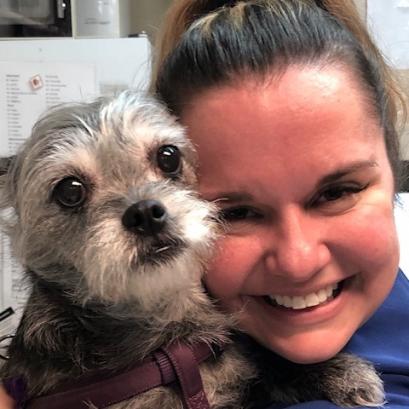Shih Tzu
iStock/Drazen Zigic
The Shih Tzu is a Tibetan toy breed born to be a furry companion. This breed dates back centuries, though the dogs weren’t formally recognized by the American Kennel Club (AKC) until 1969.
These little “lion dogs,” as their name means, were associated with Buddhism and bred to look like lions, according to the Shih Tzu Club. Imperial rulers bred Shih Tzu dogs to alert their homes to visitors with a sharp bark.
Eventually, this breed became a companion animal instead of a working guardian dog, as people in China began breeding them with Western breeds such as Pugs and Pekingese.
The first breeding pair of Shih Tzu was exported to England around 1930, and the breed made its way to the U.S. in the following decades. Shih Tzu quickly became popular with the upper class and remain one of the most popular dog breeds in the United States.
The Shih Tzu is an active and friendly breed. They are sturdy dogs, weighing anywhere between 9–16 pounds with an average height of 10 inches. Shih Tzu have long, smooth haircoats; a squished muzzle; a pronounced underbite, and short, floppy ears. Their heads are round with bulbous, expressive eyes.
Caring for a Shih Tzu
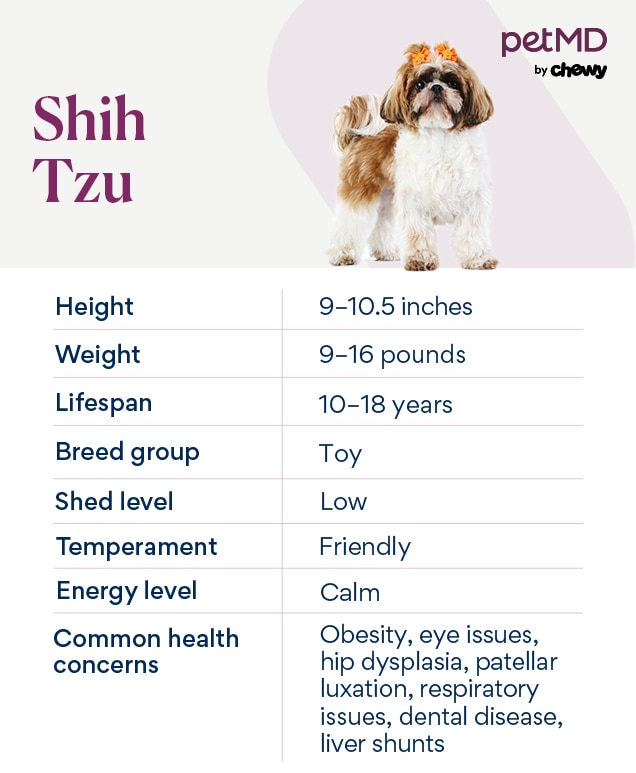
Shih Tzu are pleasant and energetic companions. They are generally happy and sociable with people—and other animals—of all ages and prefer to not spend their time alone.
Like all dogs, Shih Tzu puppies should be socialized at a young age to avoid any anxiety. Otherwise, they might display bad behaviors such as barking excessively or digging in your back yard.
All dogs, including the Shih Tzu, require exercise, but this breed is often satisfied with a 30-minute walk and at-home playtime. Shih Tzu love to be spoiled with attention and treats; they love to please their pet parents and are usually quick to learn new tricks to get the treats and praise they crave.
Most of a Shih Tzu dog’s upkeep deals with their long, luxurious double haircoat that grows continuously. They don’t shed much and are considered a “hypoallergenic” dog breed, though no dog breed is truly hypoallergenic. Their coat is also prone to tangling and matting.
This coat is often shaved short into a "puppy cut” to avoid continuous grooming, and if left uncut, the fur can grow so long that it drags on the ground. If a Shih Tzu’s coat is kept longer, brushing and bathing will be a weekly chore, with professional grooming appointments sprinkled in every few weeks.
Another important thing to know about Shih Tzu: They are brachycephalic, meaning they have a short, squished muzzle. This can put them at a higher risk for overheating or heatstroke, so they need to stay out of the hot summer weather.
Shih Tzu Health Issues

The average Shih Tzu lifespan is long, at 10–18 years. They are considered a healthy breed overall, though they can be prone to certain medical conditions. Some medical problems this breed is predisposed to include:
Brachycephalic Syndrome
Dogs with flat faces, such as the Shih Tzu, have brachycephalic syndrome. This is characterized by upper airway abnormalities such as:
-
Small nostrils
-
A long, soft palate
-
Extra tissue in the back of the throat
All of these aspects can cause trouble breathing and make Shih Tzu more prone to overheating. If the condition is severe, your veterinarian may discuss surgery to help correct some of these issues when your Shih Tzu is a puppy before they have trouble breathing.
Obesity
Shih Tzu aren’t exactly athletes—and because of this, they can often become overweight. Obesity in dogs can lead to other issues such as diabetes, arthritis, heart disease, and difficulty breathing.
It’s important to limit treats to less than 10% of a dog’s daily calorie intake and ensure your pup gets 20–30 minutes of controlled exercise (such as walks and playtime) daily.
Luxating Patellas
Patellar luxation is a condition where the kneecap slips out of its normal position, causing discomfort, limping, and arthritis. Dogs with luxating patellas will occasionally skip and hold up a back leg during walking.
Often, the patella will return back to position on its own, but sometimes surgery is recommended in severe cases.
Periodontal Disease
Periodontal disease, or dental disease, is commonly seen in Shih Tzu dogs because their teeth can easily overcrowd their small mouths. This overcrowding leads to tartar and plaque development.
Routine teeth brushing, professional dental cleanings, and surgical removal of any problematic teeth will help keep your Shih Tzu’s mouth healthy.
Hip Dysplasia
Hip dysplasia results when the hip joints don’t develop properly, and thus do not fit together. This eventually leads to arthritis, trouble walking, and pain.
Hip dysplasia is often diagnosed via X-rays and treated with oral medications or joint supplements to reduce inflammation and pain. In severe cases, surgery may be necessary.
Eye Problems
Shih Tzu have many inherited eye conditions, including glaucoma, chronic dry eye, and cataracts. Eye conditions can be quite painful, and signs include:
-
Bulging eyes
-
Rubbing the eyes
-
Squinting
Contact a veterinarian if you have any concerns about your dog’s eyes.
Liver Shunts (Portosystemic Shunts)
A liver shunt is a liver disease that causes toxins in the blood stream to bypass the liver, the organ that normally filters these toxins out of the body. The toxins build up, eventually causing chronic gastrointestinal issues, stunted growth, and even neurologic signs such as ataxia (a “drunken sailor gait”) or seizures.
Blood testing is performed to diagnose this condition, along with abdominal imaging and, often, surgery to repair the shunt, if possible. Diet changes and oral medications can also be used to manage dogs with milder signs.
Ear Infections
Shih Tzu ears are floppy, which presents two issues:
-
It does not allow air flow into the ear canals
-
It allows fur to grow inside of their ears
This combination can trap moisture in the ears, leading to red, painful, and/or itchy ears.
Your veterinarian will assess for ear infections in your Shih Tzu with a thorough examination. Infections are often treated with topical and/or oral medications.
Glomerulonephrititis
Glomerulonephrititis is a type of kidney disease inherited in Shih Tzu. It causes excess protein to be lost from the body and may cause the kidneys to malfunction at an early age. Clinical signs can include:
-
Muscle wasting
Therapy with diet changes, oral medications, and sometimes fluid therapy is required for treatment.
What To Feed a Shih Tzu
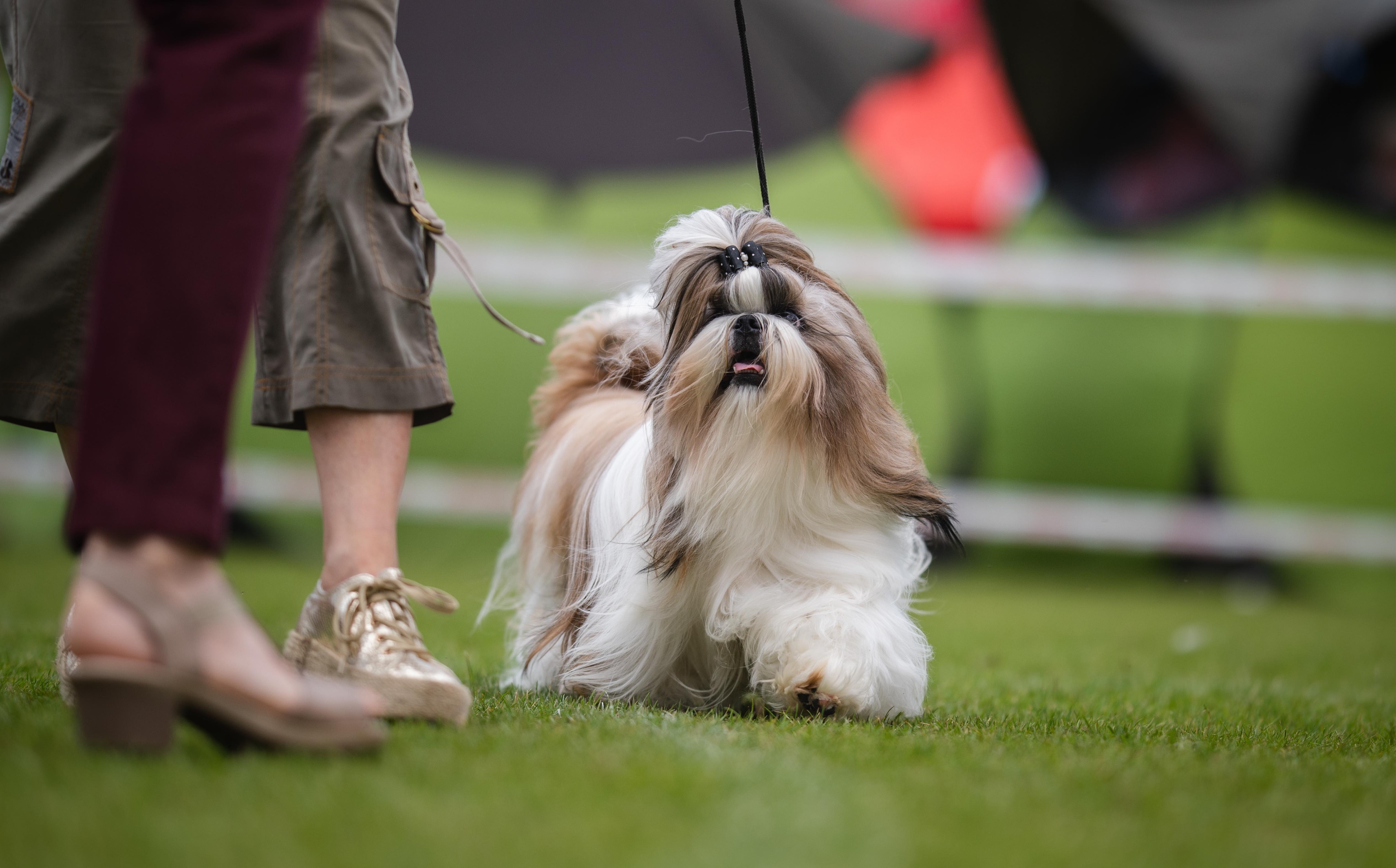
Shih Tzu are prone to obesity, so it’s important to feed them a well-balanced diet and to avoid too many treats throughout the day. A twice-daily, balanced adult small-bite diet is recommended.
Pet parents should also consider feeding their Shih Tzu dry kibble instead of canned food to lessen the risk of periodontal disease, as dry kibble is abrasive and can remove some plaque buildup. A dental-specific diet can also be beneficial.
You can also find food formulated specifically for adult Shih Tzu dogs and puppies.
How To Feed a Shih Tzu
Shih Tzu puppies need to eat frequent meals (about three or four every day) to avoid risks of hypoglycemia (low blood sugar). High-fat, protein, and complex carbohydrate meals will lessen the risk of low blood sugar issues, and well-formulated puppy small breed diets usually contain all of these components.
Slowly transition your Shih Tzu puppy to an adult dog food when they’re around 1 year old.
How Much Should You Feed a Shih Tzu?
Your veterinarian can help to calculate the appropriate daily calories your pet should eat to avoid weight gain.
When choosing a diet for your Shih Tzu, choose a small-breed food to allow for easy chewing. These formulated diets will have recommendations for how much food to offer with each feeding.
Nutritional Tips for Shih Tzu
If your Shih Tzu is eating a dog food that meets the Association of American Feed Control Officials (AAFC) guidelines, they shouldn’t need any extra supplementation unless recommended by your veterinarian.
Dog supplements that can support the health of this breed include omega fatty acids, which are good for your Shih Tzu’s heart, brain, skin, and joints. Your vet may also recommend dental chews to lessen the risk of periodontal disease.
Behavior and Training Tips for Shih Tzu
Shih Tzu Personality and Temperament
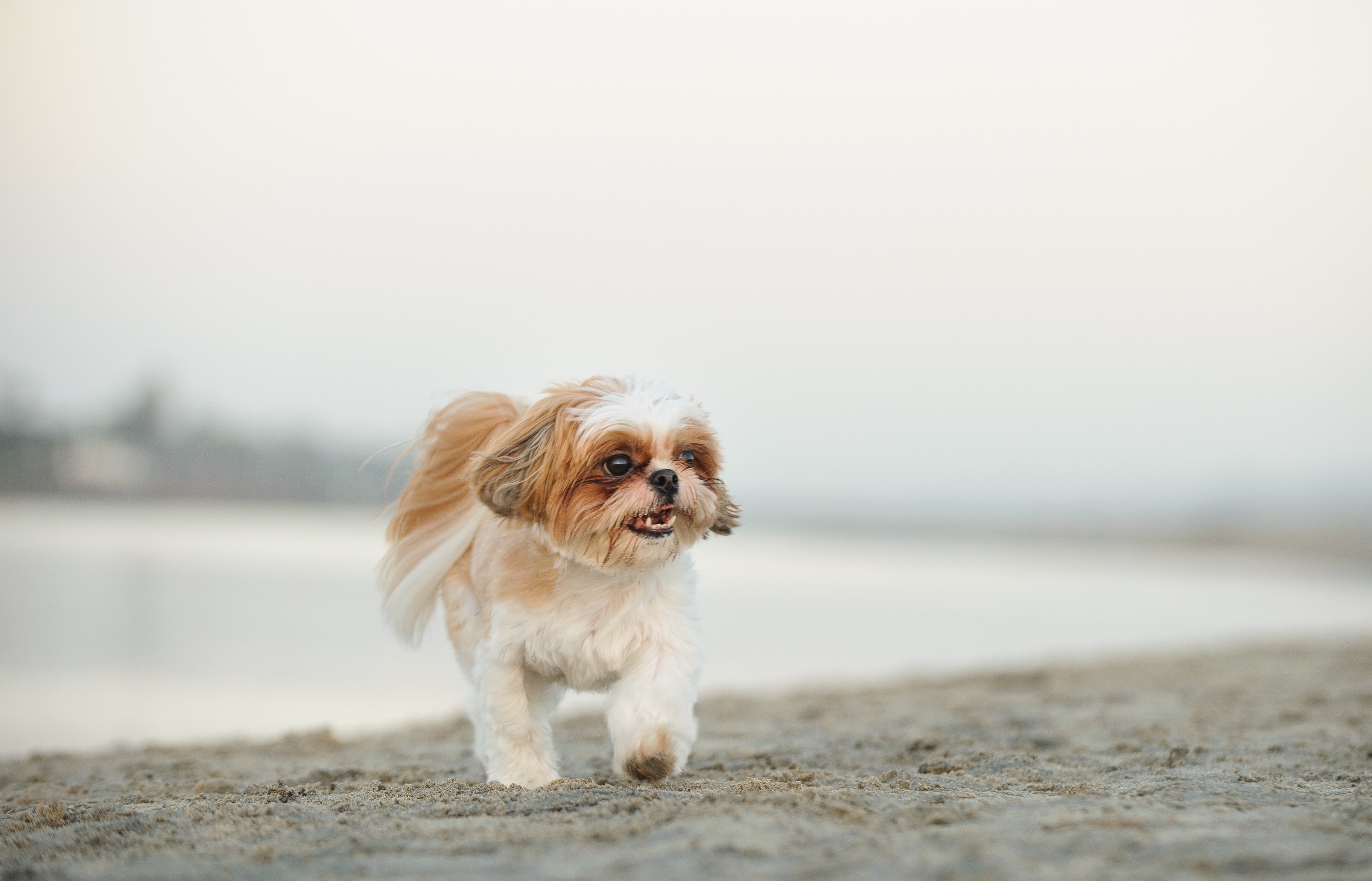
Shih Tzu are small in size but have big personalities. They make loyal, loving companions for families with children and other animals. Shih Tzu are playful, intelligent, and want to please their pet parents.
They are quite adaptable and can range from a sedentary lifestyle cuddling indoors to a more adventurous walk in the park. No matter what you do, they just want to be with their people.
When socialized at a young age, this breed can be great with children and other animals as well.
Shih Tzu Behavior
The Shih Tzu temperament is influenced by their origins as “alert dogs,” and they will still bark to alert that someone or something new is coming into their environment all these centuries later.
They can be curious and dig if left unattended, so it’s important to monitor them closely in new or outdoor environments.
Despite their built-in alarms and shovels, they have a sweet disposition and need love and attention. Shih Tzu make wonderful companions due to their small stature, loyalty, and calm spirit.
Shih Tzu Training
Shih Tzu are people pleasers and are usually easy to train. They prefer high-reward treats and positive reinforcement when training.
Just make sure to count how many calories your pup is getting from treats—these can add up fast in a small breed like the Shih Tzu and lead to extra weight.
Fun Activities for Shih Tzu Dogs
-
Neighborhood walks
-
Backyard or indoor playtime
-
Learning tricks
-
Cuddling with family
Shih Tzu Grooming Guide
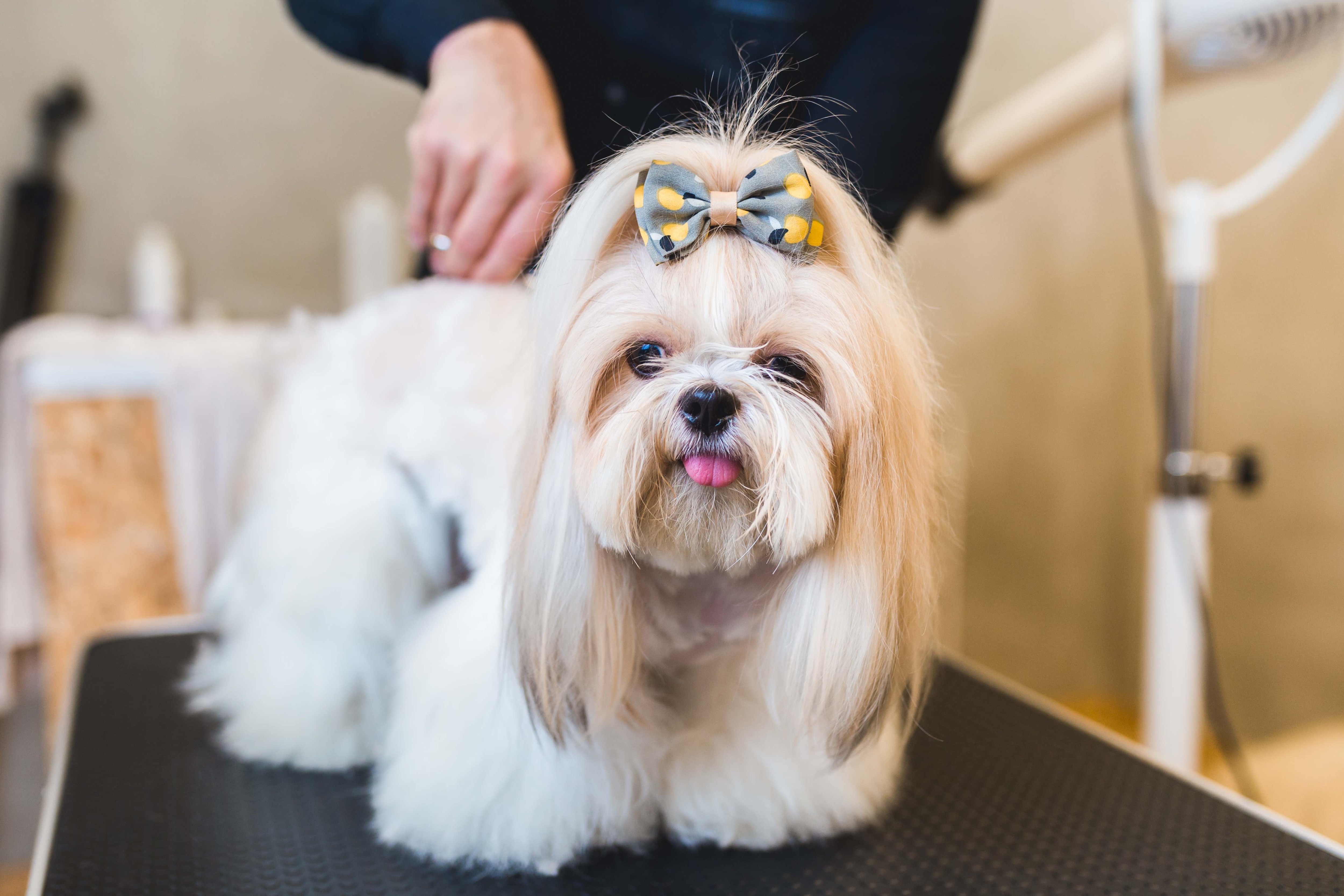
Shih Tzu are minimal shedders, but don’t confuse that with having minimal grooming needs. Their coat—which can be a variety of colors including black, white, and red—grows continuously and needs to be trimmed and brushed regularly.
Skin Care
Because their coats grow long, making them prone to matting and skin irritation, Shih Tzu dogs need be bathed once a week. Contact your veterinarian if you notice any changes in your dog’s skin, including redness, flakiness, or dryness.
Coat Care
Along with bathing, Shih Tzu must be brushed at least a few times each week, but preferably daily.
Routine professional grooming should be part of your budget, to either maintain the long hair coat or to shave it into a cute Shih Tzu haircut periodically.
Eye Care
A Shih Tzu needs the hair around their eyes trimmed or pulled up with a hair tie to avoid any eye irritation. Their eyes are prominent and can easily become inflamed if hair is allowed to rub against them.
Shih Tzu are a breed that can be prone to tear staining because of their flat face. Excessive tear production or blocked tear ducts lead to a buildup of a reddish-brown pigment at the inner corners of the eyes, often extending toward the muzzle.
Keeping this area clean and dry is the best way to avoid staining. If staining is excessive or if your dog’s eyes are red, swollen, or painful, contact your veterinarian.
Ear Care
Shih Tzu dogs are prone to ear infections due to hair growing inside of their ear canals. This hair holds onto moisture, which can cause inflammation and infection by bacteria, fungus, or both.
Routine cleaning with a vet-approved ear cleaner will help reduce the chances of ear infections. If excessive hair is noted inside the ear canals, your veterinarian or groomer may recommend removing it to avoid irritation.
Dental Care
It’s important to brush your Shih Tzu’s teeth every day with a dog-safe toothpaste and brush. Keep up with regular veterinary appointments so your vet can monitor your dog’s mouth and recommend professional cleanings under anesthesia when necessary.
Considerations for Pet Parents
Before bringing home a puppy, potential pet parents need to consider the Shih Tzu's characteristics and be prepared to meet those needs.
Because of the average Shih Tzu temperament, these happy-go-lucky dogs are happy just to be near you. They don't require a ton of exercise (though, attention and playtime are musts!) and, with proper socialization, Shih Tzu dogs are good around new people, other animals, and in novel situations.
But it is necessary for this breed to find a home where their pet parents are willing to perform routine grooming and help them stay at a healthy weight.
Shih Tzu FAQs
Is a Shih Tzu hypoallergenic?
Shih Tzu don’t shed much and are sometimes referred to as a “hypoallergenic” dog because they can be a good fit for some people with allergies. But no dog is 100% hypoallergenic, as skin, salvia, and urine still contain allergens.
Potential pet parents should spend time with the breed to see how their allergies react before bringing home a Shih Tzu puppy.
How much does a Shih Tzu cost?
The typical Shih Tzu price ranges from $1,000–$3,000, depending on breeding lines. You may also find Shih Tzu and Shih Tzu mixes for adoption at local shelters and rescues.
How big can a Shih Tzu get?
The Shih Tzu size is small. The dogs weigh between 9–16 pounds and stand about 10 inches tall.
Do Shih Tzu shed?
All dogs shed, and the Shih Tzu is no exception. However, they don’t shed much when compared to many other dog breeds.
What is the life expectancy for a Shih Tzu?
The average Shih Tzu lifespan is 10–18 years.
Do Shih Tzu bark a lot?
Yes, Shih Tzu are known to be vocal dogs. Shih Tzu were initially bred to alert monarchs and spiritual leaders of unwanted visitors, so this characteristic was bred into them.
Should you buy a teacup Shih Tzu?
No. Teacup Shih Tzus have been bred to be as small as possible, often without any consideration to their health. Do your research before bringing home a “teacup” dog.
Do Shih Tzu like to cuddle?
While every dog has their own personality, Shih Tzu are known to be loving and cuddly toward people they know.

